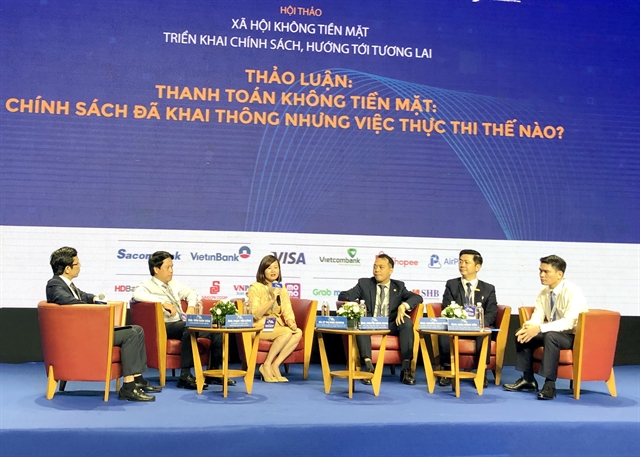Non-cash payments have increased sharply in recent time in Việt Nam, but more efforts are needed to increase their rate, a conference heard in HCM City last week.

Non-cash payments have increased sharply in recent time in Viet Nam, but more efforts are needed to increase their rate, experts said.
Speaking at 'Cashless Society: Implementing Policies, Look to the Future' last week, Pham Tien Dung, director of the State Bank of Viet Nam (SBV)’s payment department, said with the Government’s strong push, non-cash transactions have increased sharply in recent years.
In the first four months of the year, payments using bank cards increased by 15.7 per cent over the same period in 2019.
Internet payments increased by 45.7 per cent and mobile payments by 166.1 per cent.
Payment trends in the economy have shifted towards non-cash modes, while electronic payments for public services are increasing.
Nguyen Kim Anh, deputy governor of the State Bank of Viet Nam, said: “The electronic payments ecosystem has been created with the integration of various sectors allowing customers to make online payments for electricity, water, telecommunications, and shopping on e-commerce sites, and pay taxes and fees online for public services.”
Most technologies of the Fourth Industrial Revolution are applied for payments such as analysis of consumer behaviour using big data, biometric authentication, QR Code, encryption of card information, and contactless chip card payments, he said.
Ly Hoai Huong of the General Department of Taxation said by last year 99 per cent of enterprises had registered to pay taxes online and paid over VND700 trillion.
The department has piloted electronic invoices in Ha Noi, HCM City and Da Nang.
Some 53 local and foreign banks and 12 intermediary electronic data transmission service providers offer electronic tax declaration and payment services to taxpayers, she said.
As for electronic tax declarations by individuals who rent out houses, over 62,000 of them have so far sent more than 262,000 declarations, she said.
But she admitted there are still some obstacles to online tax payments, especially from individual taxpayers, due to their habit of using cash and reservations about technology.
The implementation of electronic public services at State agencies has not been uniform, making e-payment difficult, she added.
Tran Vinh Tuyen, vice chairman of the HCM City People's Committee, said: “HCM City is aiming to build a smart city. Therefore, the goal of building a cashless society is an important one.”
The city would continue to direct departments and agencies to promote non-cash payments for public services, he said.
"HCM City will work with relevant units this year to promote cashless payments."
SBV Deputy Governor Anh said: “To promote non-cash payments, the central bank will continue to focus on completing the legal framework and developing mechanisms and policies to foster cashless payment.”
It will submit to the Government for approval a decree to supersede Decree No.101 on non-cash payments and another on testing mechanisms for controlling financial technology activities in the banking sector, and issue a circular on opening payment accounts with electronic customer identification solution (eKYC or electronic know your customers).
It will continue to implement the National Comprehensive Financial Strategy to promote electronic payments at government agencies and focus on research and development and implementation of the scheme on developing non-cash payments in 2021-25.
Organised by the Tuoi tre (Youth) newspaper, the SBV’s payment department, Viet Nam E-Commerce Association and NAPAS, the conference was among activities held to mark Cashless Payment Day, June 16. — VNS





